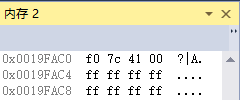#一 修改领接变量
##1.1 原理
函数的局部变量在栈中,一个挨着一个排列,如果有缓冲区,那么可能 就存在数组越界的可能,比如破坏相邻的变量值,或者破坏EBP,返回地址等。
##1.2 示例1
2
3
4
5
6
7
8
9
10
11
12
13
14
15
16
17
18
19
20
21
22
23
24
25
26
27
28
29
30
31
32
33
34
35
36#include "stdafx.h"
#include <iostream>
using namespace std;
#define PASSWORD "12345"
int verify(char * psw)
{
int auth;
char buffer[8];
auth = strcmp(PASSWORD, psw);
strcpy(buffer, psw);//缓冲区溢出点
return auth;
}
int main(int argc, _TCHAR* argv[])
{
int flag = 0;
char psw[1024];
while (1)
{
cout << "输入密码" << endl;
cin >> psw;
flag = verify(psw);
if (flag)
{
cout << "密码错误" << endl;
}
else
{
cout << "验证成功" << endl;
}
}
return 0;
}
我们来观察auth的地址以及buffer的地址
&auth:0x0019FAC8
&buffer:0x0019FAC0

很容易发现auth刚好在buffer的下方,这样我们可以利用这个缓冲区,来替换auth的内容。
我们试着输入abcdefghijk:
在执行过strcpy之后,我们观察内存:
很容易发现,0x0019FAC8 中间的值被修改了。
那我们只要构造,让溢出的时候,让其为0即可

在此处输入标题
标签(空格分隔): 网络安全
#一 修改领接变量
##1.1 原理
函数的局部变量在栈中,一个挨着一个排列,如果有缓冲区,那么可能 就存在数组越界的可能,比如破坏相邻的变量值,或者破坏EBP,返回地址等。
##1.2 示例1
2
3
4
5
6
7
8
9
10
11
12
13
14
15
16
17
18
19
20
21
22
23
24
25
26
27
28
29
30
31
32
33
34
35
36#include "stdafx.h"
#include <iostream>
using namespace std;
#define PASSWORD "12345"
int verify(char * psw)
{
int auth;
char buffer[8];
auth = strcmp(PASSWORD, psw);
strcpy(buffer, psw);//缓冲区溢出点
return auth;
}
int main(int argc, _TCHAR* argv[])
{
int flag = 0;
char psw[1024];
while (1)
{
cout << "输入密码" << endl;
cin >> psw;
flag = verify(psw);
if (flag)
{
cout << "密码错误" << endl;
}
else
{
cout << "验证成功" << endl;
}
}
return 0;
}
我们来观察auth的地址以及buffer的地址
&auth:0x0019FAC8
&buffer:0x0019FAC0

很容易发现auth刚好在buffer的下方,这样我们可以利用这个缓冲区,来替换auth的内容。
我们试着输入abcdefghijk:
在执行过strcpy之后,我们观察内存:
很容易发现,0x0019FAC8 中间的值被修改了。
那我们只要构造,让溢出的时候,让其为0即可
